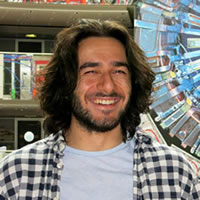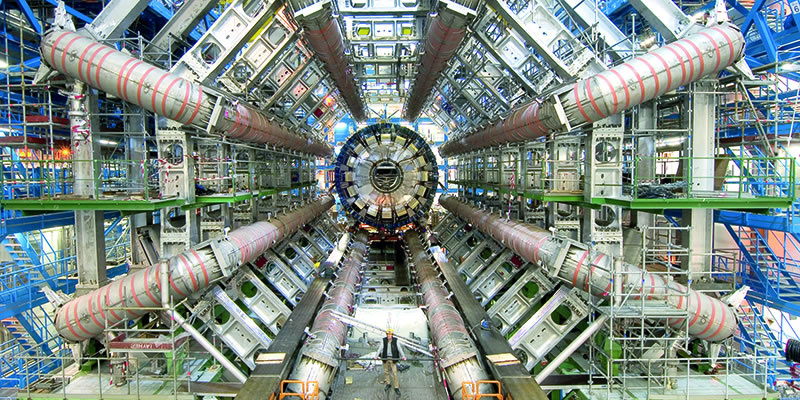Whilst at Southampton you'll gain a thorough understanding of fundamental areas of physics through theoretical and lab-based work. In addition, you’ll take modules in particle physics, advanced quantum physics and advanced computing.
You’ll be well prepared for your time at CERN, where you’ll work on one of three experiments at the LHC:
- LHCb, which is investigating differences between matter and antimatter by studying a type of particle called the ‘beauty quark’, or ‘b quark’
- ATLAS or CMS, both of which are broad research programmes looking for new particles – you could be involved in the search for heavy quarks, heavy bosons or supersymmetric particles
The research projects on offer typically fall into two categories – improving the huge detectors that observe the collisions created in the particle accelerators, or analysing the resulting data to test physics hypotheses. So whether your interests lie in theoretical studies or more practical experimentation, there will be a project to suit you.
You’ll become part of a major international collaboration, working alongside the PhD students at CERN, participating in working group sessions with other researchers on your project and presenting your work to colleagues. Some of our students have the opportunity to present at external conferences, and your research could lead to the publication of your first scientific paper.
You’ll be well supported during your time abroad, with a research supervisor on site at CERN, and regular communication with academics at Southampton.
It’s also a great opportunity to broaden your life experience. You’ll live and work in one of Europe’s most cosmopolitan cities, with beautiful lakes and mountains nearby. And as a member of the CERN community you can get involved in some of the many staff-run clubs and social activities.
View the 2019/20 programme specification document for this course
View the 2020/21 programme specification document for this course
Research-grade facilities
In your first three years you’ll use state-of-the-art equipment in our teaching laboratories, with guidance from expert technicians who are there to support your experimental work. You’ll also benefit from our recently refurbished Physics and Astronomy foyer, with a specialist library and dedicated study spaces.
During your year abroad you’ll have access to CERN’s library and computing facilities. If you’d like to improve your French, a programme of language classes is also on offer.
A top-five research department
Study with us and you’ll join one of the top five Russell Group departments for physics and astronomy research (REF 2014). Our research reputation is built on a track record of discovery and we remain on the frontline of new developments. For example, Southampton physicists were instrumental in the development of erbium-doped amplifiers, which make today’s internet possible. More recently our scientists were involved in detecting gravitational waves and light from the collision of two neutron stars for the first time.
Particle physics is a major research area at Southampton, so you’ll learn from expert academics who bring new theories and discoveries to the classroom. Staff in our Theoretical Particle Physics group are investigating the latest ideas in the field; their projects include analysis of LHC data from CERN to contribute to the search for undiscovered particles. The group’s work is enriched by its involvement in the South East Physics network (SEPnet) particle physics collaboration, which links the work of specialists across a number of UK universities and research institutes.
Accreditation
Our MPhys Physics programmes are accredited by the Institute of Physics
Programme Structure
If you’re among the top-performing students on the MPhys Physics degree, you’ll be invited to apply for this flagship degree at the end of year two. If you’re successful, you’ll switch to the flagship programme at the start of year three. The third-year curriculum is carefully coordinated to cover the core MPhys Physics modules and specialist particle physics modules, leaving year four clear for your time at CERN.
Optional modules allow you to pursue your physics interests. You could also broaden your education by learning a language or choosing from a range of innovative cross-disciplinary modules, on topics including law, business and bioengineering.
To Apply
All undergraduate applications for Physics and Astronomy should be made online through the Universities and Colleges Admissions Service (UCAS).
Students interested in this degree should apply to F303 MPhys Physics.
Find out how to apply and get further details about UCAS' website, phone and contact details.
Key Facts
Join the international research team at CERN in Geneva. Gain experience that will make you stand out from the crowd when applying for a PhD.
Live and work in one of Europe's most cosmopolitan cities, with beautiful scenery nearby
100 per cent of our Physics and Astronomy research has been rated world leading or internationally excellent for its impact on society (REF 2014)


